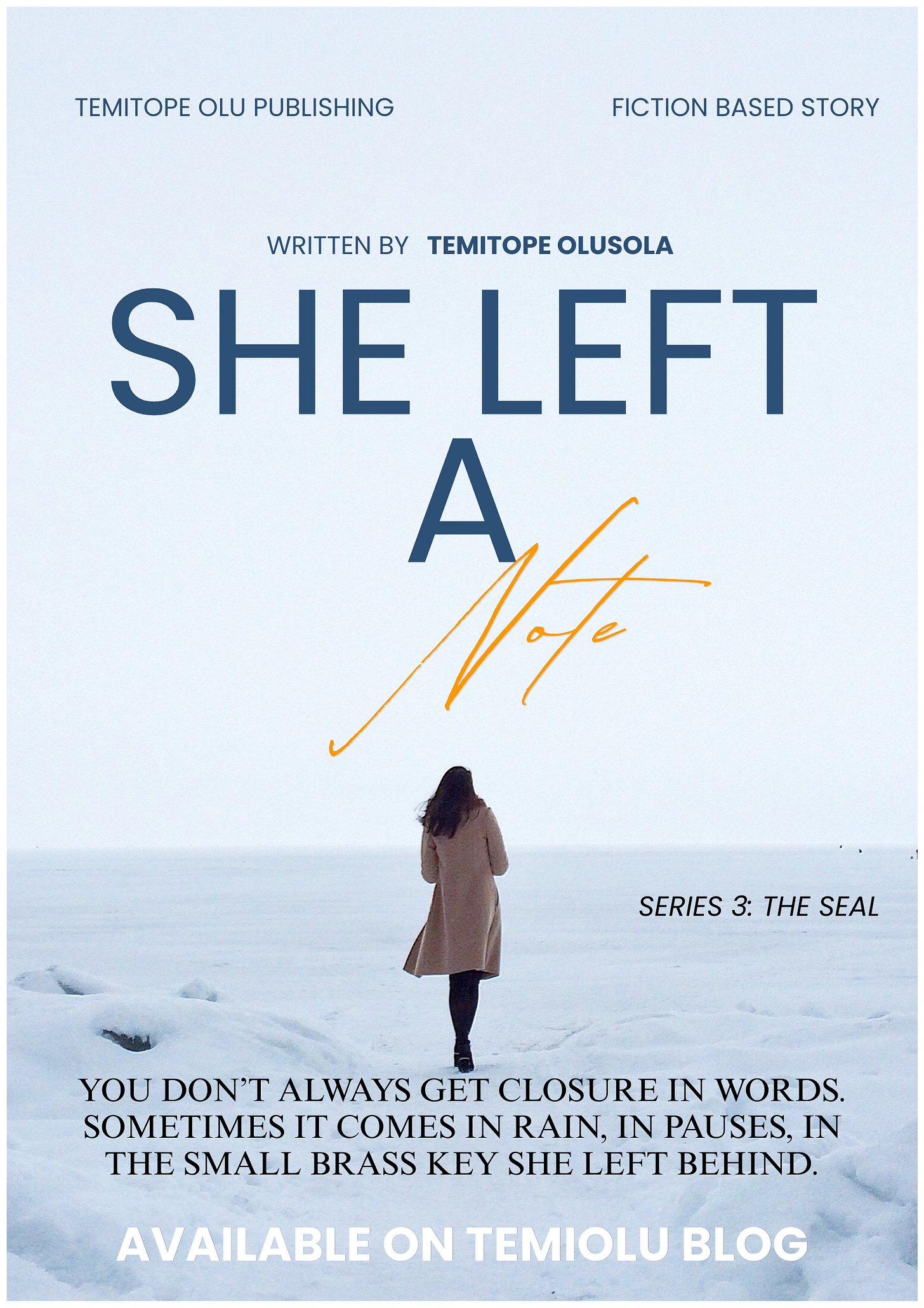Series 3: The Seal
You can ask me next time, she said gently. You don’t have to carry it alone.
They didn’t rush back into the life they had before; there were no grand declarations, no sudden flood of texts or late-night calls. Instead, there were small, intentional steps. Coffee on Saturdays, a shared walk home from the bookstore, a silent agreement that they wouldn’t push for more than what felt safe.
She noticed the difference first, the way he listened without immediately trying to solve it. How he asked questions, not as an interrogation, but as an invitation. He noticed, too, how she no longer apologised for needing space, how she met his eyes without flinching when she spoke about the things that scared her.
One evening, they painted his living room together. It wasn’t planned, though she had mentioned how dull the walls looked, and he had said, “Pick a colour.” They ended up with soft sage green on their hands, faces, and somehow in her hair.
It was messy. It was imperfect. And it was theirs.
Later, as they sat on the floor eating takeout, she leaned her head on his shoulder. He didn’t move, didn’t make it into something heavier than it was. They just sat there, letting the moment be enough.
She thought about the note she’d left weeks ago. About how certain she had been that leaving was the only way to keep herself whole. And now, sitting here, she realised something: sometimes love needed to be torn apart just enough so it could be rebuilt with better bones.
He caught her smiling at nothing in particular, what? He asked.
Nothing, she said softly, “just… it feels different this time.” And it did, not like a fire blazing wildly, but more like a slow-burning lamp, steady, warm, and built to last.
Then came Tuesday, which felt unfair cos Tuesdays were supposed to be quiet, uneventful days.
The message came while he was at work, from an outsider, but about her. A mutual friend, someone who didn’t mean harm, mentioned seeing her with someone else, laughing and leaning in. That kind of leaning that used to belong to him.
He told himself not to spiral and not to read into things, but by the time they met for their usual Thursday coffee, the air between them already felt different.
She noticed the stiffness in his shoulders, the way his smile didn’t quite reach his eyes. “What’s wrong?” she asked, stirring sugar into her cup though she never actually added any.
“Nothing,” he said, too quickly, but nothing weighed it now. And she could feel it pressing against her chest. Finally, he told her, not with accusation, but with that hesitant edge of someone who doesn’t want to be wrong but needs to know.
She didn’t flinch. It was my cousin, she said, simply a faint smile tugging at the corner of her mouth. We were planning my aunt’s surprise party, and apparently, we often lean when we talk.
Something in him unclenched and then something else, like shame, maybe slid in to take its place. He hated how easily his mind had reached for the worst version of the truth.
“You can ask me next time,” she said gently. “You don’t have to carry it alone.”
And there it was, the test, not about trust in the broad but in the poetic kind of sense. But trust in the small, everyday moments where it’s easiest to build walls instead of asking questions.
They sat there, the silence between them not sharp this time, but soft, like a pause that promised more. It was raining, not the stormy kind, but that steady, silver drizzle that makes the world feel softer.
They walked without umbrellas, letting the damp settle into their clothes, their hair. Neither of them seemed to mind. He had been thinking for days about what she’d said that he didn’t have to carry it alone. It stayed with him, replaying in quiet moments like a song he hadn’t realised he knew the words to.
When they reached the bridge, she stopped. “Do you remember,” she asked, when I told you I don’t like making promises? He nodded. She had once said promises felt like cages, and she’d rather give someone her presence than her vows.
Well, she continued, reaching into her pocket, I still believe that, and I also believe some things deserve to be marked. She pulled out a small, old brass key, a little tarnished, but warm from her hand.
It’s to the box under my bed, she said, my journals are in there, my real ones. The pages I’ve never shown anyone. He stared at her, unsure what to do with the weight of it, not the key itself, but the trust it carried.
I’m not asking you to read them, she added. I just… want you to know you could, if you ever need to understand me when I can’t explain myself. He took the key, not because he wanted to open the box, but because it was her way of saying: Here. This is me. All of me.
And maybe that was the point. Sometimes trust wasn’t about grand gestures or final words. Sometimes it was about a small, old brass key, pressed into your palm in the rain, sealing a promise that didn’t need to be spoken.
Thank you for lending your time, your eyes, and maybe even a piece of your own heart to this journey. Stories breathe deeper when they are held by someone who feels them, and you’ve done just that. Wherever you are, may you find peace in your waiting seasons, and may you never forget some notes aren’t goodbyes. Sometimes, they’re the start of something new.
With warmth,
Temitope Olusola


